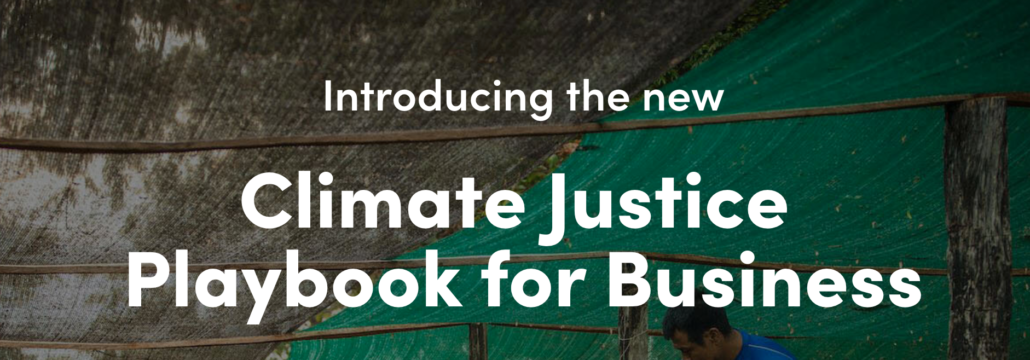This website uses cookies so that we can provide you with the best user experience possible. Cookie information is stored in your browser and performs functions such as recognising you when you return to our website and helping our team to understand which sections of the website you find most interesting and useful.
As part of our work to amplify the important work in the Wellbeing Economy movement, these WEAll Weekly Update blogs will share some of the latest and greatest updates from our membership and beyond. Please use the comment box to share any relevant updates from this week and keep the conversation going!
Weekly Reads

Climate Justice Playbook for Business – B Corporation
As the source of the vast majority of the planet’s greenhouse gases, the business sector is uniquely culpable for the climate emergency. The business sector is therefore responsible for demonstrating leadership in eliminating emissions, drawing down carbon as rapidly as possible, and directly addressing the injustices brought about or exacerbated by climate change.
The Power of Corporations in a Digital World – Oxfam Report
“Our key concern is to consider the significance of data and algorithms, the establishment of monopolies, and policy assumptions in competition law. Our touchstone is whether digitalization supports the social and ecological transformation of the economic system or – what we hope to avoid – hampers it.”
Bridging the Divide Between Impact Investing and Native America – Stanford Social Innovation Review
Saying that it’s important to include Indigenous Peoples in decision-making practices is one thing, but if the majority lack capital screens founded on Indigenous principles and practices, how can it translate into action?
The Economics of Biodiversity – Dasgupta Review
“It would seem then that, ultimately, we each have to serve as judge and jury for our own actions. And that cannot happen unless we develop an affection for Nature and its processes. As that affection can flourish only if we each develop an appreciation of Nature’s workings, the Review ends with a plea that our education systems should introduce Nature studies from the earliest stages of our lives, and revisit them in the years we spend in secondary and tertiary education. The conclusion we should draw from this is unmistakable: if we care about our common future and the common future of our descendants, we should all in part be naturalists.”
Crack the Crises – The Global Goals
“Join organisations from across the UK, advocating for a better future for people and planet, have come together in this new coalition. We want to bring people together to tackle these crises by taking individual actions, by supporting others and by asking decision-makers to act.”
Job Openings & Opportunities
- Well-Being Economies Specialist – David Suzuki Foundation
- Trainer and Practitioner Community – Stir to Action
- IE University Announces Gurus and Griots Fellowship for African and Afro-descendent Leaders – IE University
- FCDO Next Generation Economics competition – UK Government
- Interim Ops, Projects & Finance Team Member – Dark Matter Labs
- Senior Manager, Thriving Cities Initiative (Copenhagen, North America or Durban) – C40 Cities
- Share a story: Who’s a great example of social change where money, power and accountability are with the people they’re meant to serve?
- Research Project: The Governance of Food Systems in Cities: Assessing Risks and Gaps for a Sustainable Transition in the Decade of Action
- Research Project: Building a ‘Wellbeing Economy’: developing a capability-based approach to capturing the complexity of social justice on a healthy planet
What to Watch
- Wonderspace Episode 20 feat. Katherine Trebeck
- Children’s Wellbeing Budgeting with Jennifer Wallace
- Crisis of Understanding? Paradigm shifts, priority changes and future of the state – OPSI feat. Katherine Trebeck
- Building Back Better: Reform and Renewal after COVID – feat. Katherine Trebeck
- How Soon Is NOW? A Conversation with filmmaker Claudia Rinke
- Working Practices – Katherine Trebeck
Listen Up
- From green privilege to green gentrification– Shareable
- Debunking the myth of Homo Economicus – Upstream Podcast via Shareable
- Pitchforks and Arcadia: overcoming fear with a new vision – FEASTA
- The Wellbeing Economy Lessons for the Future Policy Lab Podcast
- Discover WEAll Youth and the Wellbeing Economy
Upcoming Events
- Next Economy MBA “Meet the Instructors” – LIFT Economy
- Regeneration Pollination “Speed Networking” Events – the Global Regeneration CoLab
- February 17: Organizing for Food Sovereignty in Boston: A Personal History – Cities@Tufts
- February 23: How to go even more local after COVID-19 – Shareable
- February 24: Economies FOR the Future ~ Life at Work ~ Deep Dive No. 3 ~ 2021 – Dr. Claudia Gross
- February 24: Slower by Design, Not Disaster – Peter A. Victor
- February 25: Exploring Systems Change for a Post-Covid World – Systems Innovation
- February 25: Understanding Systemic Racism: “The Role of the Radical Writer”
- March 3-20: What Next Summit – Transition Network
- March 10: Exploring Invisible Women Syndrome – Cities@Tufts
- April 27 & 28: SEWF 2021
- May 19 & 20: Impact Summit – FutureX
WEAll Originals
Blogs:

- How do we ensure a Wellbeing Economy is inherently antiracist?
- A ‘Market for Values’ as an instrument for human and ecological wellbeing – Marco Senatore
- Village in the City – Building micro-local community around the world – a WEAll ‘Wellbeing Economy Correspondents’ Blog
- What might social media look like in a Wellbeing Economy?
- The 2021 Wellbeing Economy Reading List
Publications:
- Wellbeing Economy Messaging Guide– Positive Money, PIRC, NEON, and WEAll
- Measuring Wellbeing, Rutger Hoekstra
- Business in the Wellbeing Economy, Olga Koretskaya & Gus Grosenbaugh
From the Archives
- 10 Principles to Build Back Better
- Rebuilding to a US Wellbeing Economy
- What is a Wellbeing Economy?
- The Business of Wellbeing Guide
the discussion?
Let us know what
you would like
to write about!

